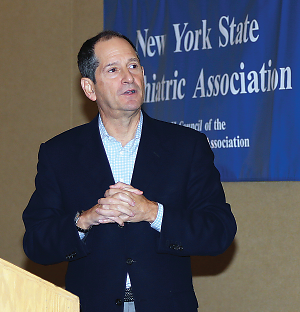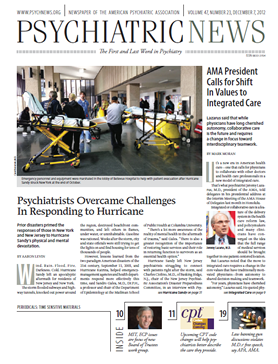“One of the most significant changes to psychiatric practice in decades.”
That’s how New York State Psychiatric Association (NYSPA) Executive Director Seth Stein, J.D., characterizes new changes to the psychiatric CPT coding scheduled to take effect in January. Those changes are an extension of the parity law, he said, because they place psychiatrists on an equal footing with other physicians for how they document and bill for outpatient services.
“This is not just a change in CPT code numbers,” Stein told Psychiatric News. “This is a change that reflects a much more fundamental realignment of psychiatric services with the rest of the medical specialties.”
Stein and the NYSPA have been offering hands-on training workshops, using templates that members can apply in their practices, to district branch members in Westchester, Manhattan, Brooklyn, Queens, Long Island, Syracuse, Albany, and elsewhere throughout the state. (A recent workshop in Buffalo was cancelled because of Hurricane Sandy.)
“We have trained over 800 psychiatrists in New York and will be holding additional trainings in the next 30 days,” Stein said. So important are the changes, and the need for psychiatrists to master the new coding system, that he urged other district branches to offer similar training to their members. In December, Stein will respond to an invitation to offer the workshop to psychiatrists in Vermont.
Staff in APA’s Office of Healthcare Systems and Financing offered a “train the trainer” workshop in November, and they noted that while New York has done the most extensive training on the CPT code changes, other district branches are beginning to follow suit. Members are encouraged to contact their district branches and ask whether they are offering CPT workshops.
The new codes, the result of work by APA with the AMA CPT Editorial Panel and other major mental health associations, are designed to address long-standing concerns about existing codes that fail to reflect the complexity of work that clinicians do today with complex, medically ill psychiatric patients. For instance, the codes commonly used by psychiatrists have primarily consisted of psychotherapy with evaluation and management (E/M) codes (for example, 90805, 90807), which have minimal work attributed to the E/M component, and a fixed low-level medication management code (90862).
The new coding system includes refinement of psychotherapy codes, keyed to three levels of time spent with the patient, and inclusion of “add-on” codes to be used when psychotherapy is provided in conjunction with E/M work—such as medication management. The new system also eliminates the pharmacologic management code (90862) and replaces it with existing E/M codes (see Major CPT Coding Changes Coming Soon: Start Preparing Now).
“When I talk to members, I remind them that psychiatrists have historically been placed in a ’coding ghetto’ with regard to how we bill for outpatient services,” Stein said. “The new code changes liberate us from the coding ghetto so that psychiatrists can bill like all other physicians. It’s very significant and will have a profound impact on our discussion with insurance carriers.”
Stein said that as with all change, there is some resistance. But he said that psychiatrists can quickly assimilate the new CPT coding system into their practice and will find it a welcome change.
“I think that once they get the mind-set of how to look at these changes, they shouldn’t find it difficult,” he said. “Psychiatrists will need to think like internists—they are doing disease management of chronic conditions, performing evaluation and management, and providing a procedure, which is psychotherapy, to treat the condition.
“This isn’t about changing what psychiatrists do, but changing how they capture what they do in a note,” Stein said. “No one has to change how they practice psychiatry, but they have to change how they document what they do.”


